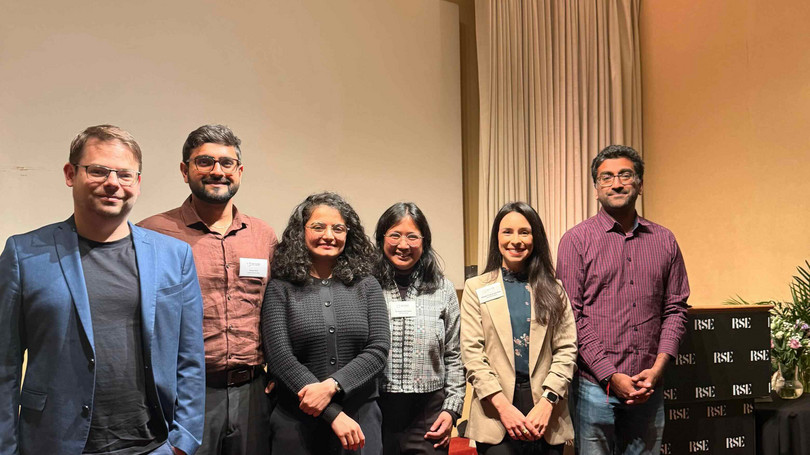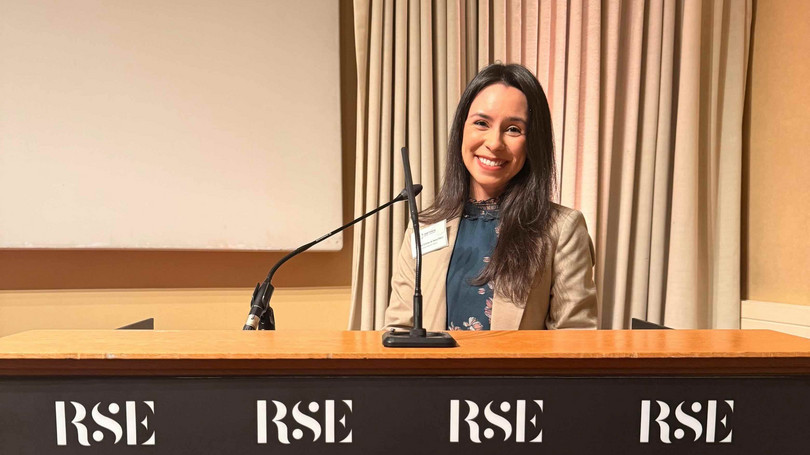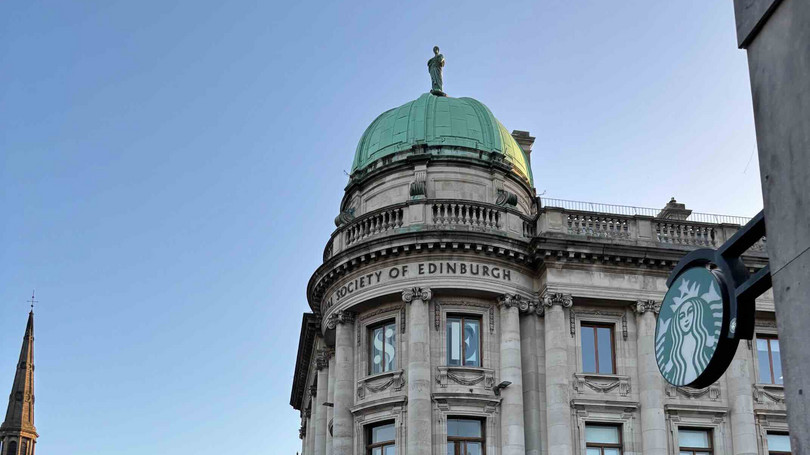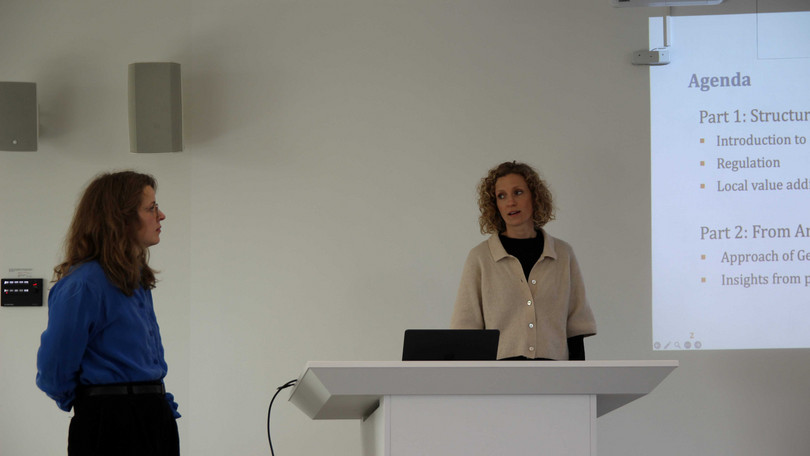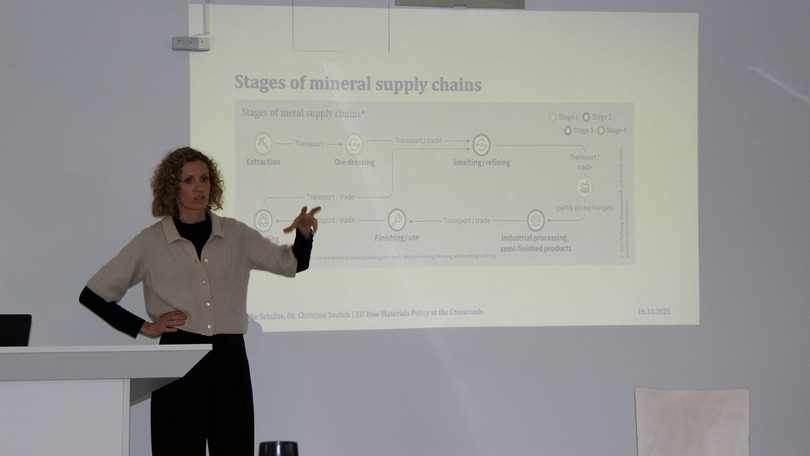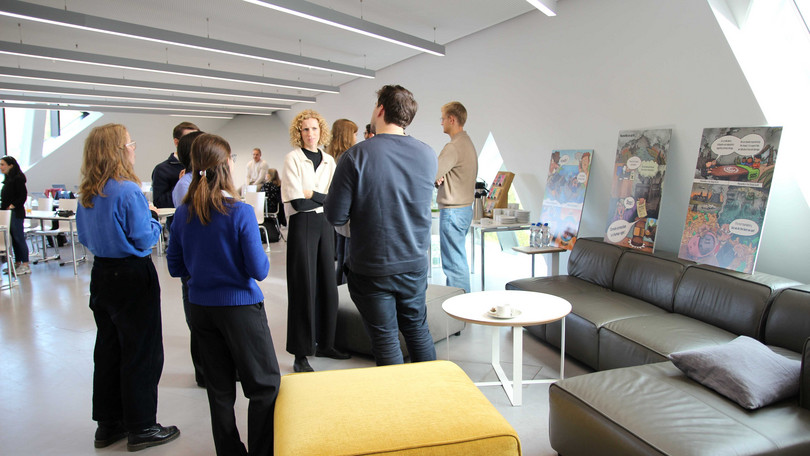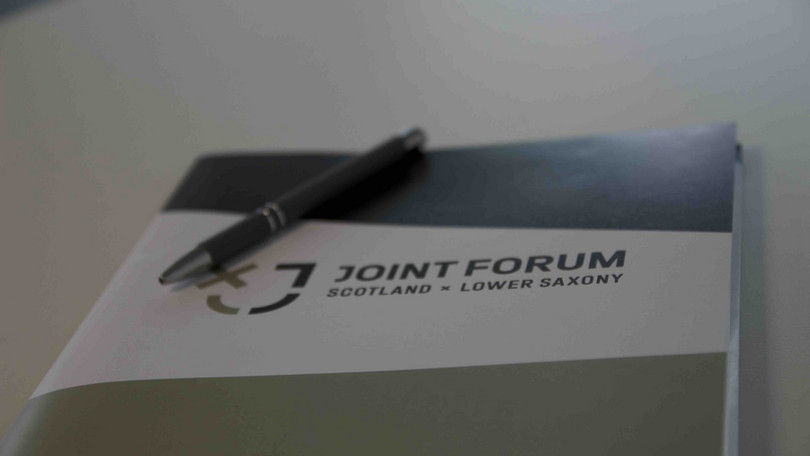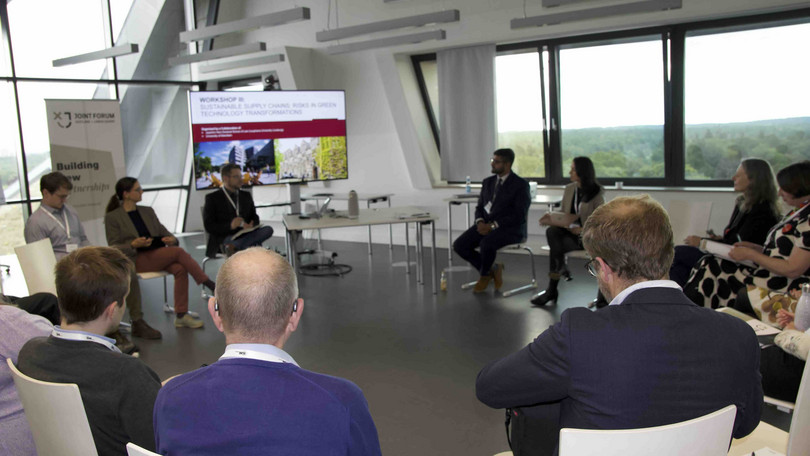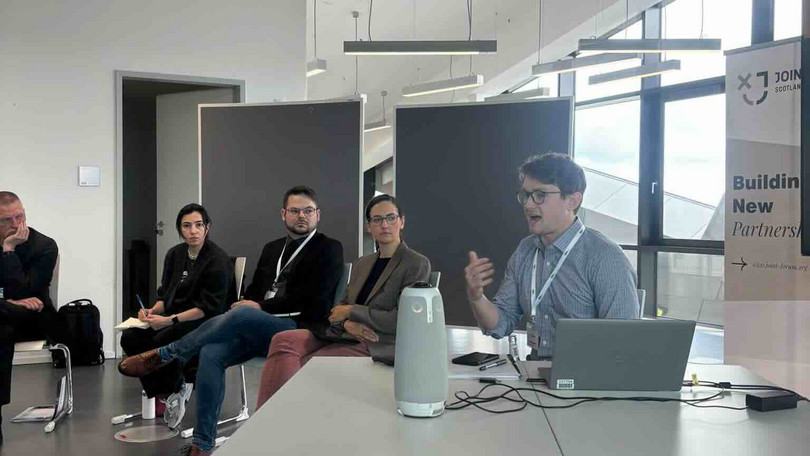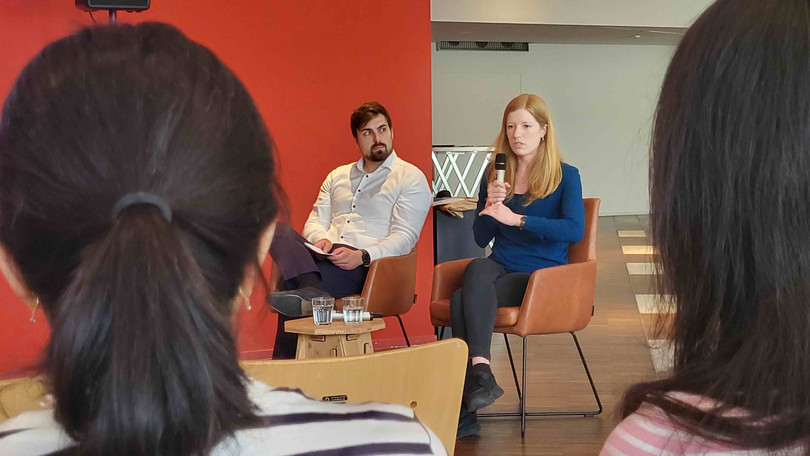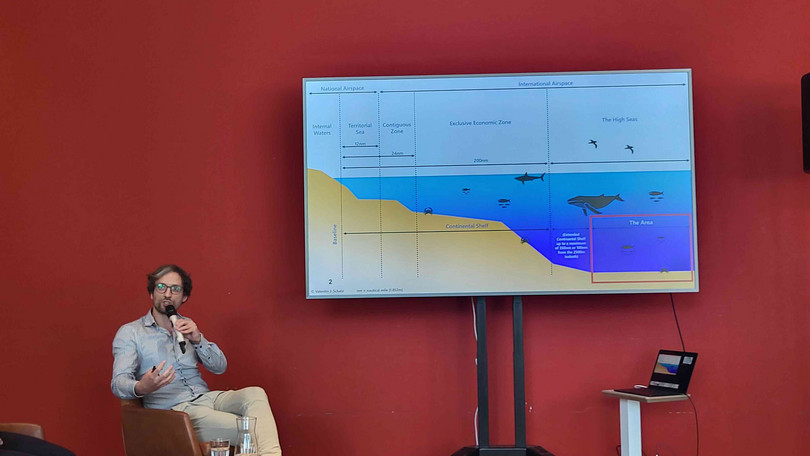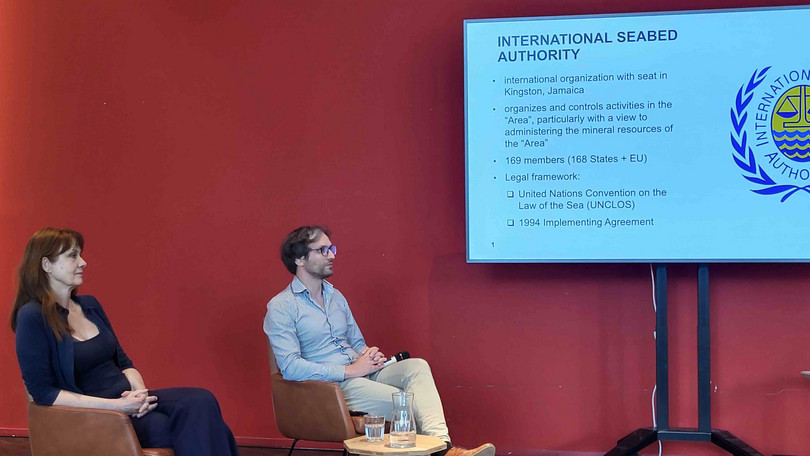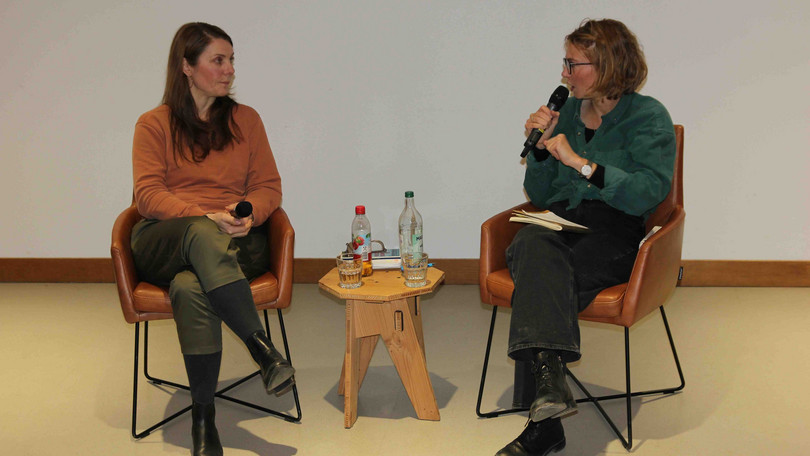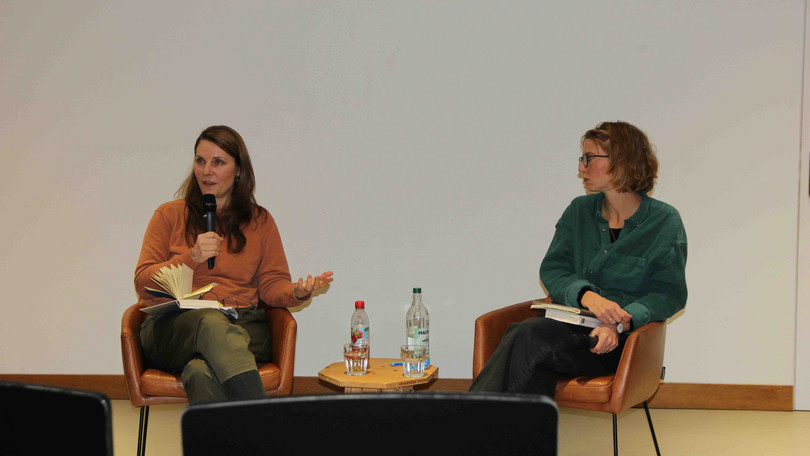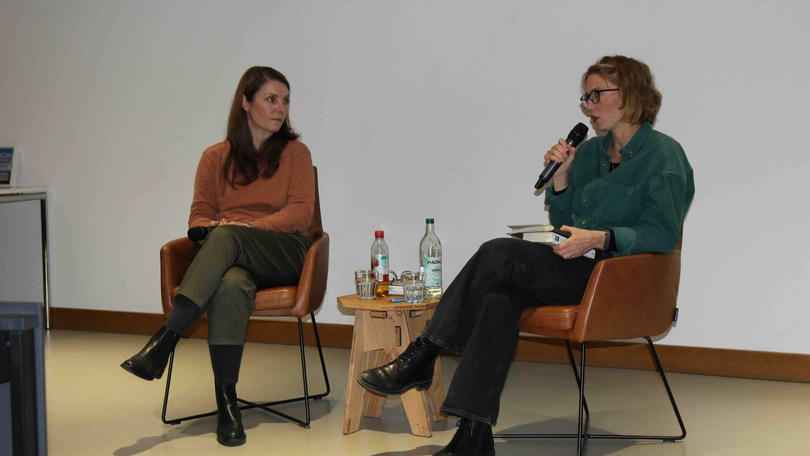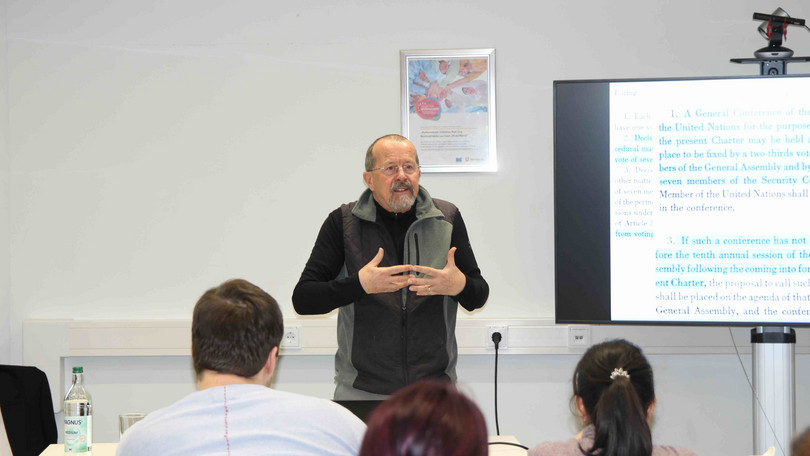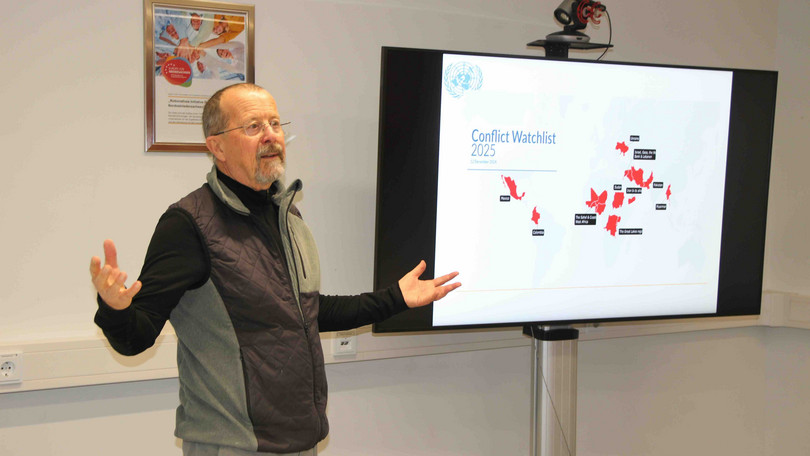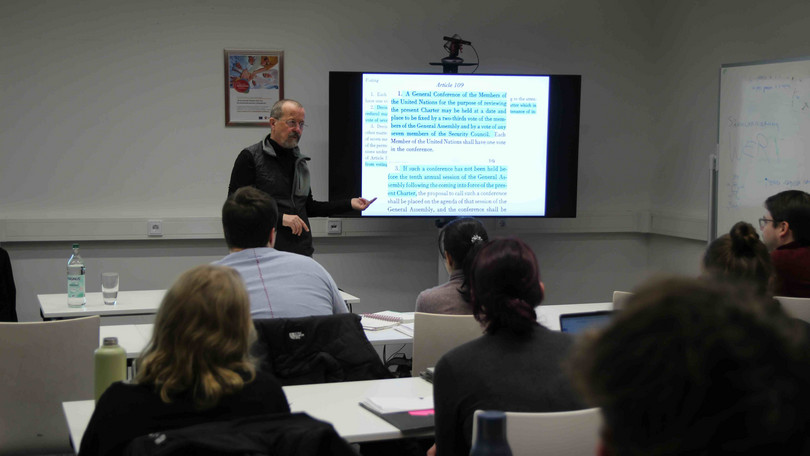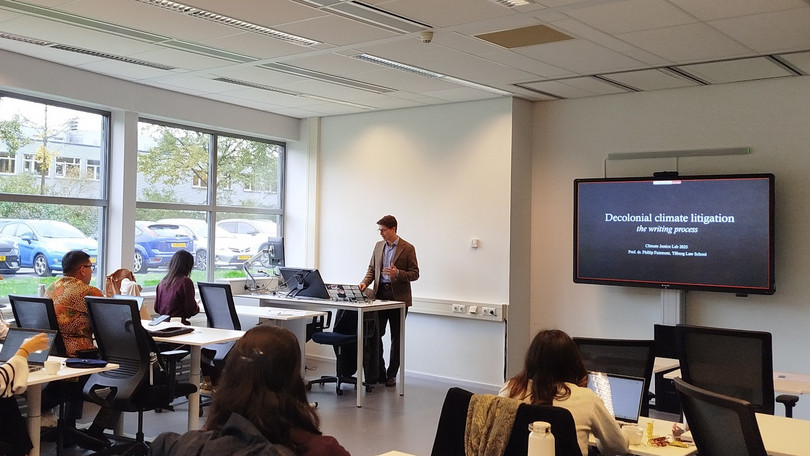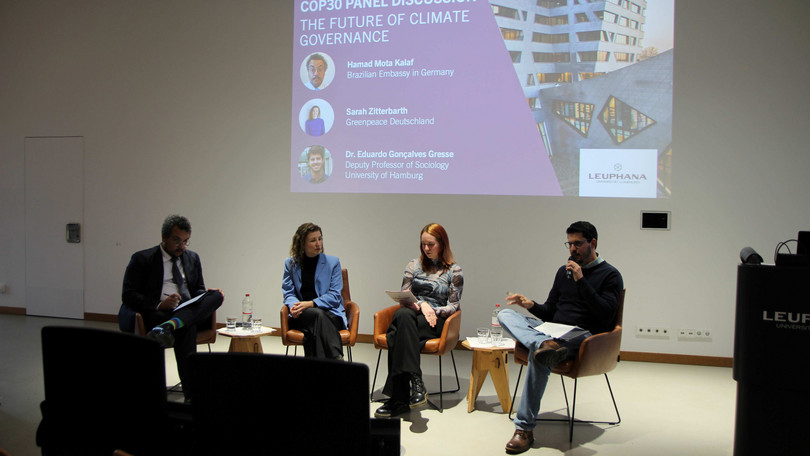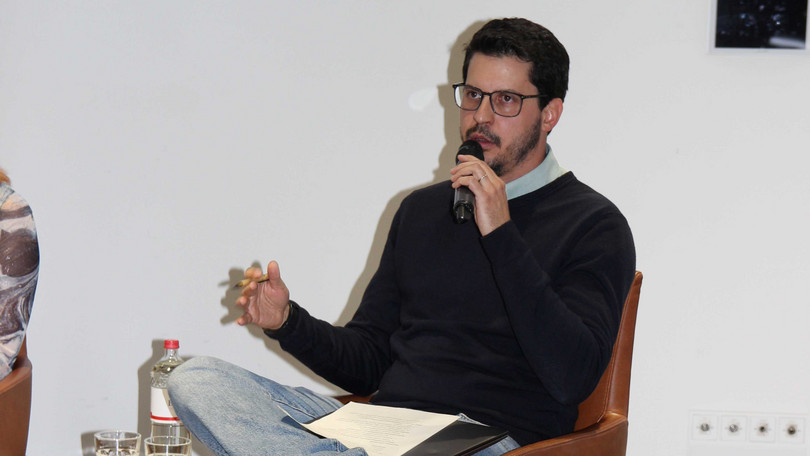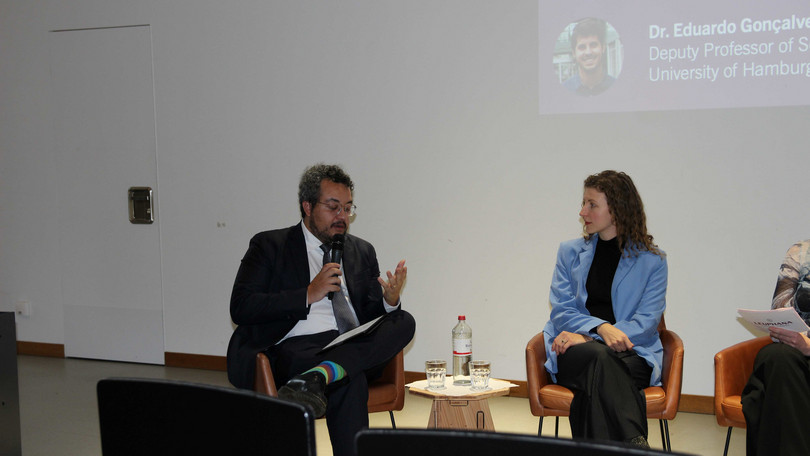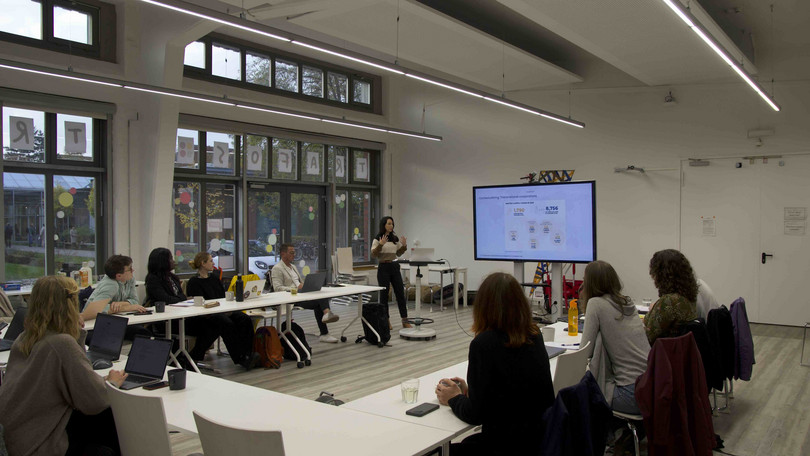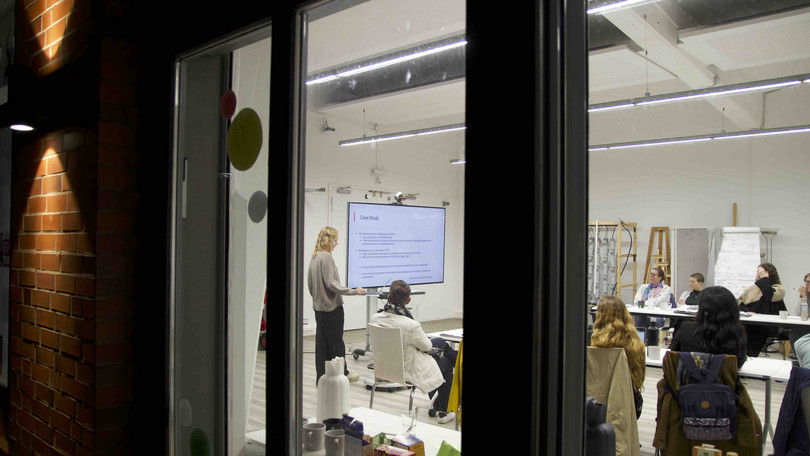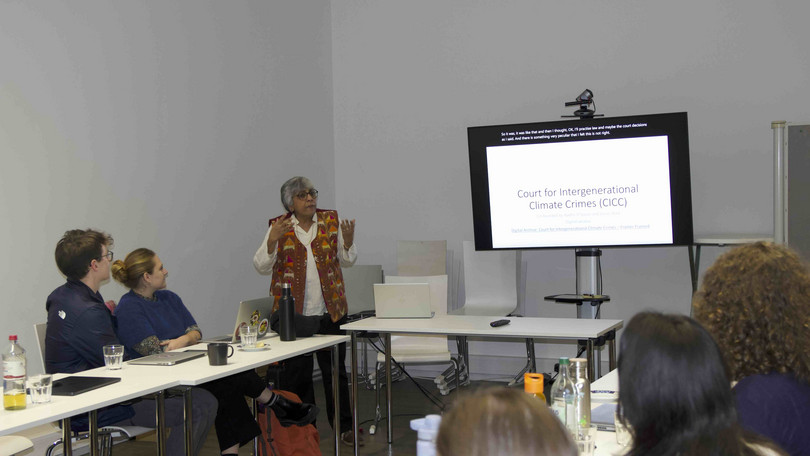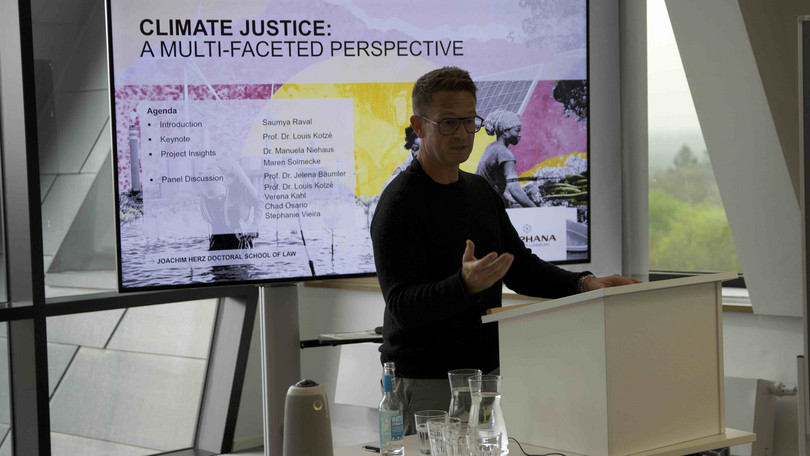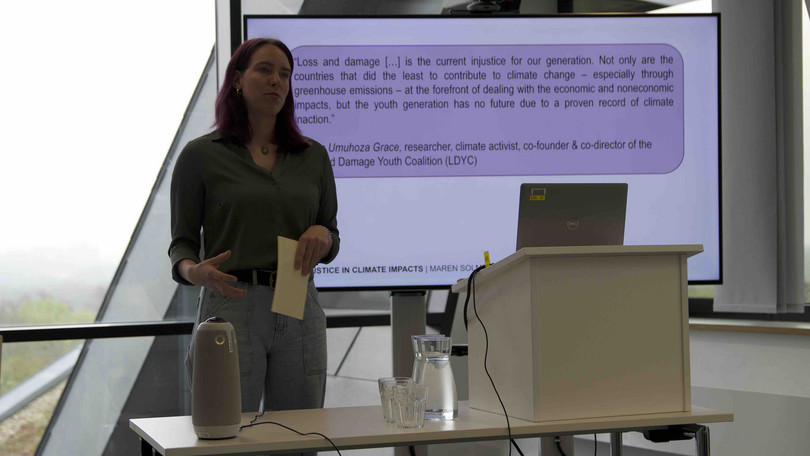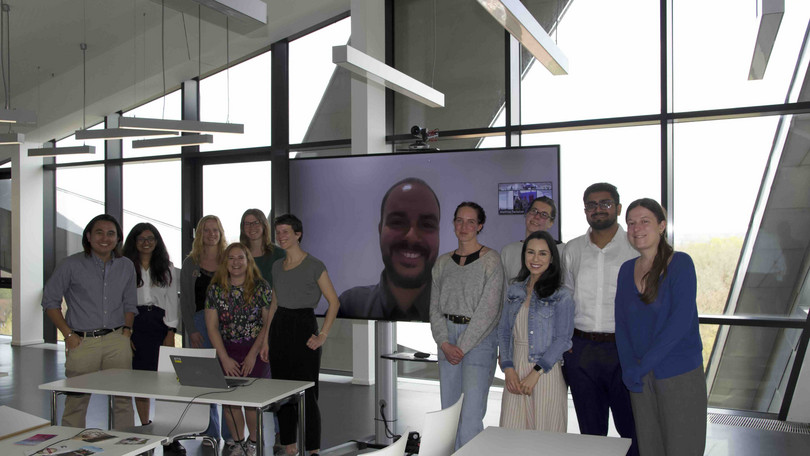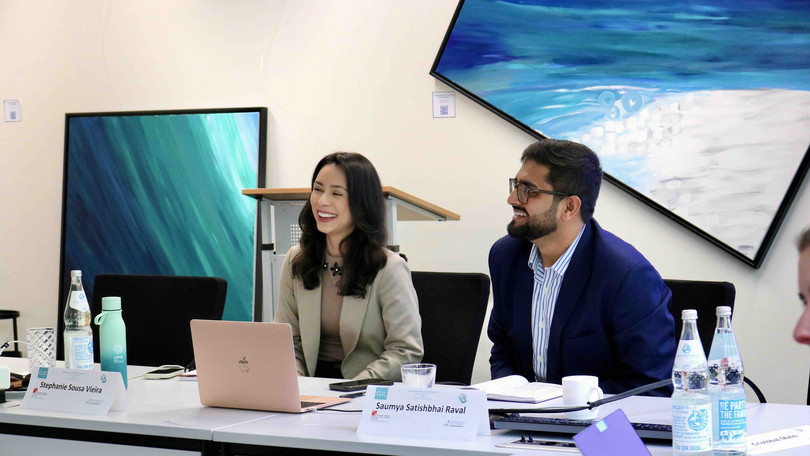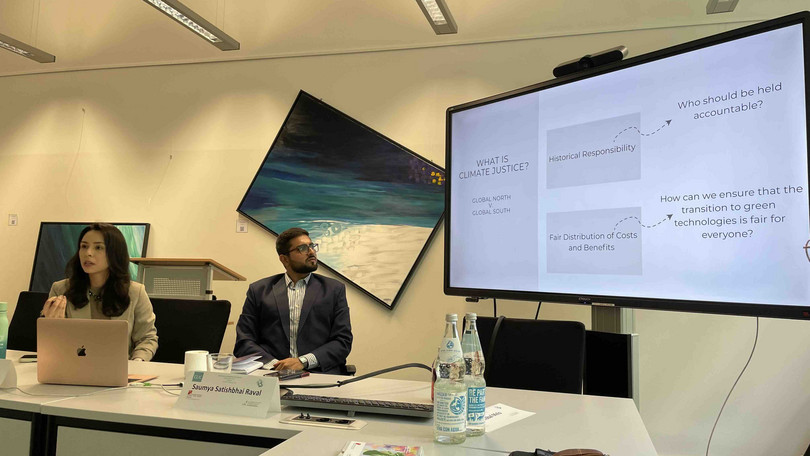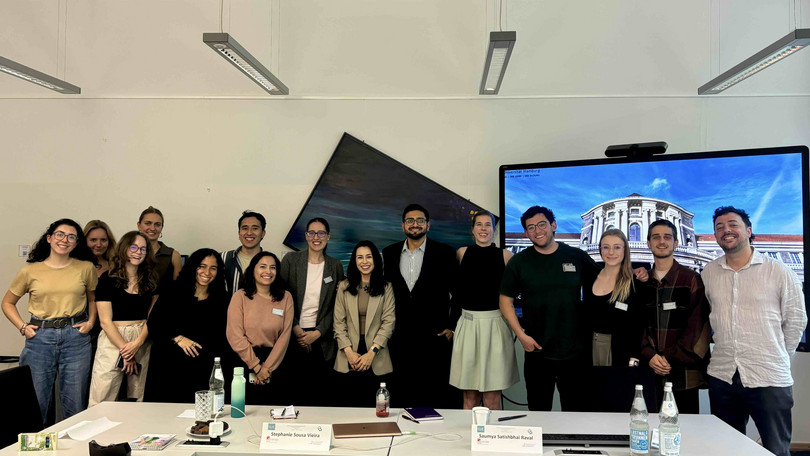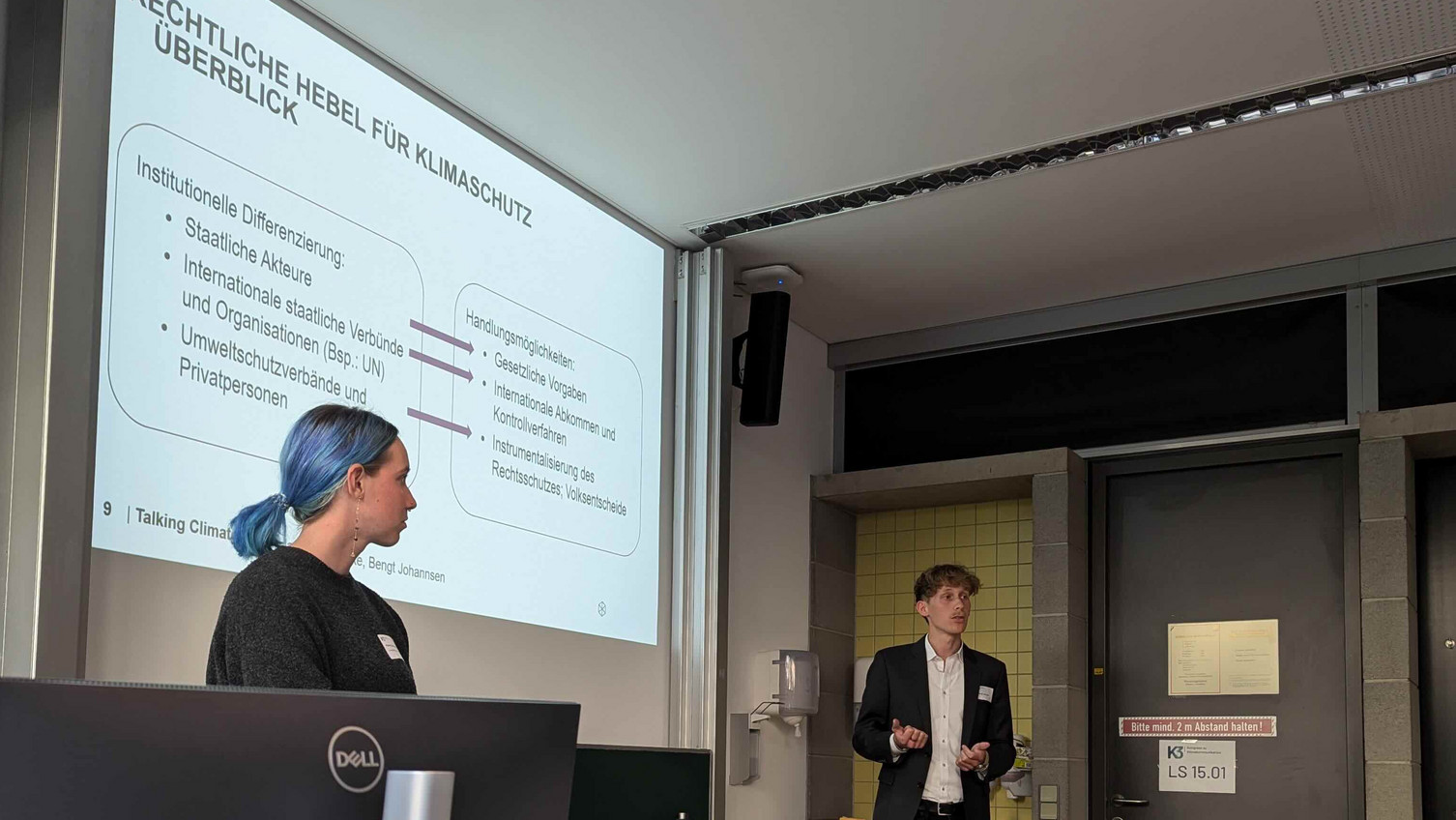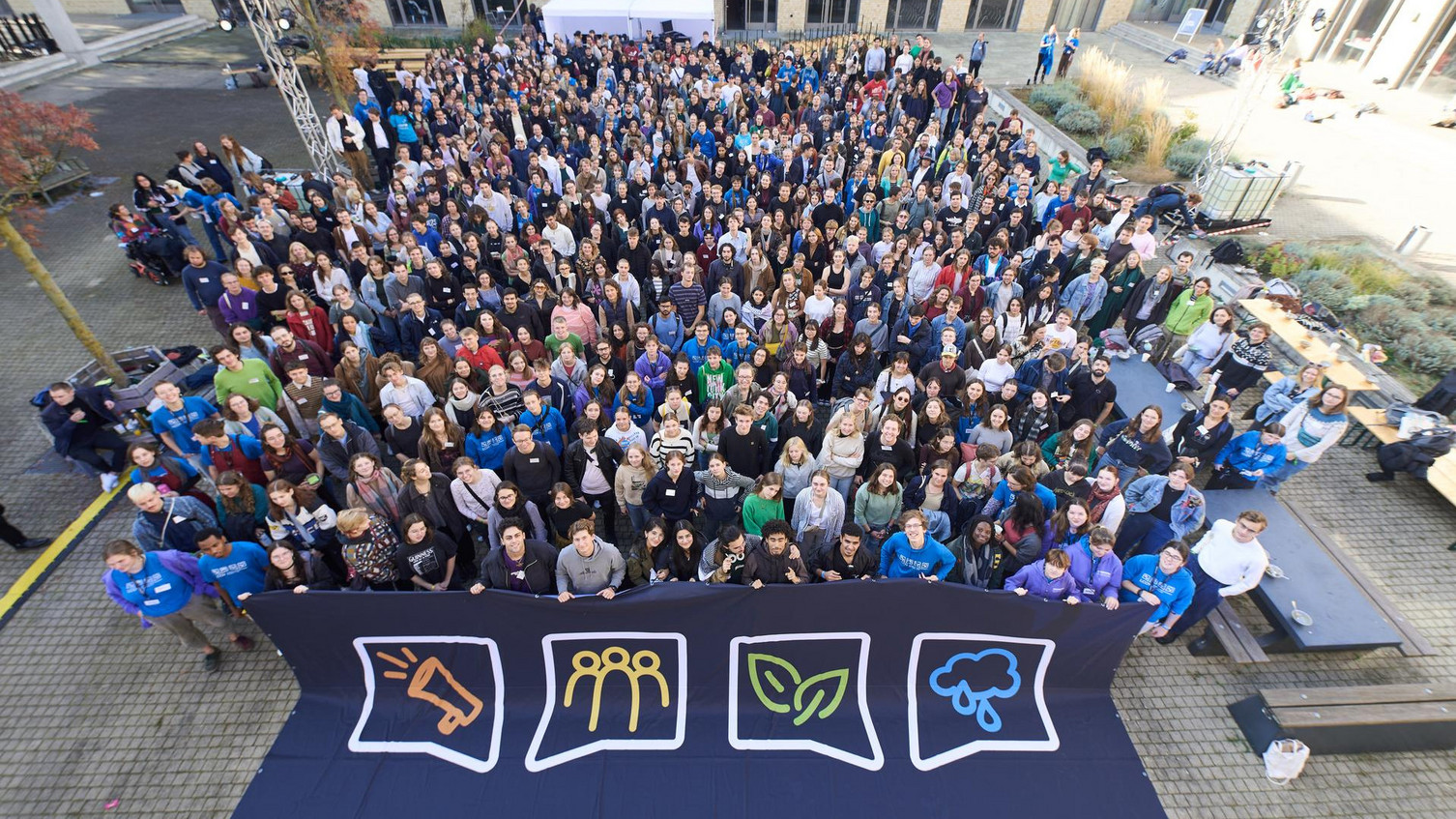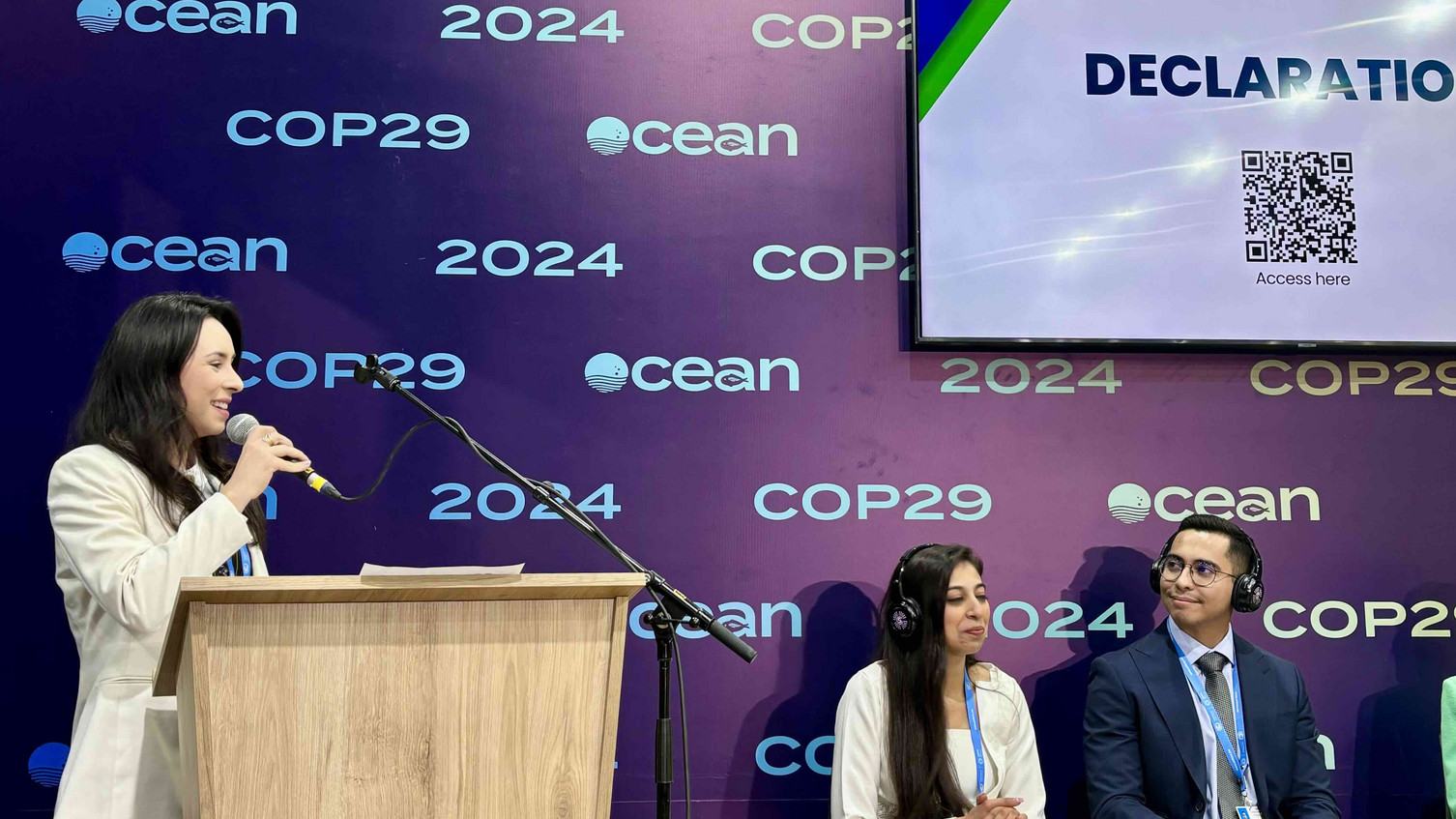In the thematic area of digitization and law, the Joachim Herz Graduate College addresses topics that arise in the course of the constant change and development of the digital world. Technical progress in this area is advancing rapidly, particularly in fields such as artificial intelligence, the interconnection of services and areas of life, and the provision of information. These developments raise questions regarding data protection, fair competition, the prevention and punishment of criminal offences, and the preservation of fundamental personal rights and civil liberties.
Guest Lecture: Public Communication and Constitutional Protection
- Professor Dr. Antje von Ungern-Sternberg
- 25 February 2026 (digital lecture)
On 25 February 2026, Professor Antje von Ungern-Sternberg will deliver a guest lecture at the Joachim Herz Doctoral School on the topic of
'Public Communication and Constitutional Protection'.
Professor von Ungern-Sternberg has examined a 2025 ruling by the Rhineland-Palatinate State Constitutional Court (link), drawing conclusions about how governments at state and federal levels may express themselves regarding constitutional parties and the limits of public relations work by public authorities.
Professor von Ungern-Sternberg is a professor of German and foreign public law, state church law and international law at the University of Trier, where she is also the director of the Institutes for Law and Digitalisation (link) and Legal Policy (link).
Doctoral Forum: Digital Law
16 to 17 June 2025 at the Bundeskanzler-Helmut-Schmidt-Stiftung
Participating Fellows: Gülce Korkmaz, Julia Matthäus, Klara Westerlage
From 16 to 17 June 2025, the Joachim-Herz-Promotionskolleg, in collaboration with the Universität Innsbruck, the IT:U- Interdisciplinary Transformation University Austria, the Universität Heidelberg, and the Leibniz-Institut für Medienforschung | Hans-Bredow-Institut, hosted the Doctoral Forum: Digital Law.
The forum provided an opportunity for participants — all of whom doctoral students from the collaborating institutions — to present their research and take part in workshops on research methods and knowledge transfer, led by Marie-Therese Sekwenz (link) and Prof. Dr. Ben Wagner (link). Prof. Dr. Matthias C. Kettemann (link) offered insights into the interplay between ethics and AI, as well as the DSA. The event concluded with a presentation by João Andrade Neto (Superior Electoral Court of Brazil) on the influence of social media on elections and politics in Brazil.
The event took place at the Bundeskanzler-Helmut-Schmidt-Stiftung in the City Centre of Hamburg.
Doctoral Forum: EU Digital Sovereignty
27 - 28 October 2025 at the European University Institute (Florence, Italy)
Participating Fellows: Julia Matthäus, Klara Westerlage
The multilateral cooperation between different universites on digital law, and with it the Doctoral Forum series, will continue in October 2025. For the new academic year, the partner organisations are pleased to welcome a new institution, the European University Institute in Florence, Italy, on board. The European University Institute will host the upcoming workshop, which is being organised and led by Professor Dr Ben Wagner (IT:U Linz, TU Delft).
We look forward to this terrific meeting with enlightening discussions and inspiring workshops on digital law, particularly focusing on digital sovereignty.
The green transformation of society and - inextricably linked to it - the energy and mobility transition are gathering pace. With the help of wind power, solar energy, and other renewable energy sources, the move away from fossil fuels is set to succeed. The aim is to reorganise the transport and energy sector in a climate-neutral way and thus achieve net zero by 2050.
However, striving to fulfil this goal goes hand in hand with a rapidly growing demand for so-called critical raw materials. These include cobalt, lithium, nickel, and rare earths. Some of these are extracted under precarious working conditions, in violation of basic human rights, and at the expense of local populations and the environment. The fact that these raw materials have so far been extracted primarily in countries of the Global South means that it is precisely these countries that have to bear the consequences and costs of raw material extraction.
Against this background, this programme line poses questions on the topic of justice in the extraction of and the dealing with raw materials, the relationship between the Global South and the Global North, and the moral and legal obligations for industrialised countries arising from this situation.
- Workshop: Who Holds Responsibility in Global Supply Chains?
- Digital Seminar: ‘How can we prevent a race to the bottom in global supply chains?’
- Guest Lecture: Global Value Chains for Critical and Strategic Raw Materials
- Workshop: Sustainable Supply Chains - Risks in Green Technology Transformations
- Public Screening: Deep Rising
Workshop: Who Holds Responsibility in Global Supply Chains? Concepts from the Global South to Rethink European Corporate Governance
27 and 28 October 2025 (Joint Forum 2025)
Participating Fellows: Stephanie de Sousa Vieira and Saumya Raval
Thanks to funding from the European Centre for Advanced Studies (link), the Joachim Herz Doctoral School, together with the GoChains research group (link), held a workshop at this year's Joint Forum at the Royal Society of Edinburgh on 28 November 2025. The workshop was entitled:
„Who Holds Responsibility in Global Supply Chains?
Concepts from the Global South to Rethink European Corporate Governance“
It brought together researchers from Leuphana University Lüneburg and the University of Edinburgh for an exchange. The Joint Forum is an event designed to facilitate networking and strengthen relations between universities and colleges in Lower Saxony and Scotland.
The representatives from the University of Edinburgh were Dr Deval Desai (link), Dr Rowena Azada-Palacios (link) und Bhavinee Singh (link). They presented findings from the 'Reversing the Gaze' project (link) at the workshop, impressively demonstrating how colonial pasts continue to influence the law and life in many former colonies.
Two doctoral students from the Joachim Herz Doctoral School, Stephanie de Sousa Vieira and Saumya Raval, then showed how such colonial patterns are threatening to repeat themselves in light of current legal developments. The German Supply Chain Act and the Corporate Sustainability Due Diligence Directive (CSDDD) are examples of regulations that extend beyond the jurisdictions of legislators (whether from nation states or the EU) into third countries; thereby repeating colonial patterns.
For the Joachim Herz Doctoral School, collaborating with the Scottish partners was an enriching experience, as the legal, theoretical and historical background to many colonial relationships and legal systems in former colonies has been insufficiently researched to date. Thanks to the 'Reversing the Gaze' project, Leuphana University Lüneburg's findings on current due diligence standards could be linked to theoretical and historical components, providing a clearer, more comprehensive picture.
Digital Seminar: HOW CAN WE PREVENT A RACE TO THE BOTTOM IN GLOBAL SUPPLY CHAINS?
07 November 2025
On 7 November 2025, we hosted a digital seminar with the GoChains research group (link) and the Heinrich Böll Foundation (link), exploring the question
‘How can we prevent a race to the bottom in global supply chains?’
The event provided a platform for contributions addressing the current situation with regard to the protection of human rights and environmental standards (at various legal levels) along global value chains. Contributions also addressed the reasons why and how successes already achieved in securing these standards are under pressure and potential future developments.
Measures to weaken already adopted regulations are often justified on the grounds of efficiency, economic necessity and reducing bureaucracy. However, constant political battles over this issue and the amendment of the relevant regulations create a state of ongoing legal uncertainty, resulting in a lack of economic predictability. Furthermore, there is a risk that this process will result in legal regulations that no longer meet the needs of those affected or the environment.
Contributors to the event included Prof. Dr. Jelena Bäumler (Leuphana University Lüneburg), Julie Ruaud (assistant to Majdouline Sbaï, MEP), and Craig Bradshaw (Inclusive Development International). The event was moderated by Johanna Sydow (Heinrich Böll Foundation).
The event marking the start of the 2025/26 academic year (cf. here) focused on issues relating to global value chains. Dr Christina Saulich (Federal Ministry for Economic Cooperation and Development, BMZ) and Meike Schulze (German Institute for International and Security Affairs, SWP) gave a presentation explicitly addressing the topic of critical and strategic raw materials and the associated supply chains These materials play a prominent and indispensable role in the green transition.
The speakers raised many interesting points, including the extent to which these materials can be used for strategic leverage, how Europe can ensure stable supply and value chains (thereby achieving greater security and economic resilience), and whether human rights concerns are considered in their governance. They presented their perspectives from the viewpoints of both the German government and a civil society actor. These insights into government action and practical experience provided a broader and more comprehensive understanding of the topic, facilitating an interesting exchange with academia.
WORKSHOP: SUSTAINABLE SUPPLY CHAINS - RISKS IN GREEN TECHNOLOGY TRANSFORMATIONS
11 June 2024 (as part of the Joint Forum)
Participating Fellows: Stephanie de Sousa Vieria, Saumya Raval
The Joachim Herz Doctoral School organised a workshop on the topic of "Sustainable Supply Chains - Risks in Green Energy Transitions" as part of this year's Joint Forum (link).
The Joint Forum is a conference series of the European Centre for Advanced Studies (link) and promotes scientific cooperation between Scotland and Lower Saxony. It provides cooperation projects between researchers from these regions with space to present, discuss, and further develop their projects.
In collaboration with Dr Bennett Collins (link) from the University of Aberdeen, Stephanie de Sousa Vieira (link) and Saumya Raval (link), both of them fellows at the Joachim Herz Doctoral School of Law, presented the first step of a Lower Saxony-Scotland collaboration within the context of this conference. This project deals with the problem that the raw materials required for the energy and mobility transition in the Global North are mostly extracted in countries of the Global South. In some cases, the extraction of so-called critical raw materials (such as lithium, cobalt, nickel, and rare earths) leads to massive and systematic human rights violations and deprives the local population of their livelihoods (e.g. through environmental pollution or land grabbing). This in turn raises the question of how the fact that the energy and mobility transition in regions of the Global North is taking place at the expense and to the detriment of people in the Global South should be categorised from a moral and legal perspective (also against the background of former colonial and current neo-colonial power structures).
The following speakers provided valuable insights on this topic, which could be further deepened during this workshop (in a subsequent discussion):
- Dr Anaïs Tobalagba, Rights and Accountability in Development (RAID, link)
- Dr Julia Benkert, Leuphana University of Lüneburg (link)
- Dr Jose Antonio Ballesteros Figueroa, Tecnológico de Monterrey (link)
- Dr Bennett Collins, University of Aberdeen (link)
We would like to thank all participants and the audience for their valuable contribution to this project.
On 28 June 2024, the screening of the film "Deep Rising“ (from 2023) took place in the forum of the central building of Leuphana University Lüneburg.
The documentary deals with the topic of deep-sea mining and addresses the associated dangers and risks for humanity and nature. It focuses on the economic amibitions of private actors in this context and also casts a critical light on the activities of the International Seabed Authority, which is responsible for regulating the extraction of raw materials from the ocean floor.
The film draws particular attention to the incalculable consequences of the economic exploitation of these raw material deposits. Accordingly, there is an acute danger of the lasting destruction of an entire ecosystem about which mankind has hardly any information to date. Any intervention in this context could therefore lead to irreparable damage within a habitat that is home to countless as yet unknown species.
However, due to the energy transition and the green transformation, the demand for critical raw materials such as cobalt, nickel, and lithium is so high that private investors are nevertheless considering mining them in the depths of the oceans. This creates substantial tension between economic concerns and environmental interests in the context of deep sea mining.
The experts invited to the subsequent panel discussion addressed these points and discussed them with the audience:
- Anna Gross, CEO DEEPWAVE e.V. (Link)
- Daniela Herrmann, Greenpeace Germany (Link)
- Prof. Dr. Valentin Schatz, Leuphana University Lüneburg (Link)
We would like to thank them once again - as well as Johannes Ipsen (fellow of the Joachim Herz Doctoral School of Law) as the discussion moderator - for their participation and contribution to this event.
Global crises pose numerous challenges to the international and European order and inevitably require adjustments. In addition to climate change, the loss of relevance of multilateralism, the emerging fraction of the international community along power-political and economic fault lines, and the numerous wars and armed conflicts, among others, are forcing the global community to face a complex and multifaceted process of transformation. The effects of these crises do not stop at the borders of the European Union, forcing it to adapt accordingly, to seek European and international solutions, and to rethink its role at global level. This format line therefore focuses on the role of law at the European and international level and how current transformation processes and adaptation needs are (or can be) addressed in this context.
Global Europe Lab
- Academic Year 2025/26
- Participating Fellows: Julia Matthäus, Katrin Müller
The Global Europe Lab brings together 10–12 young scholars and junior professionals from various disciplines and backgrounds to discuss and develop a vision for the European Union's (EU) future role on the global stage.
Multilateralism is in crisis, great power politics are making a comeback and the EU is struggling to find its place in this rapidly changing global landscape. The erosion of the transatlantic alliance — previously considered a fundamental and reliable partner in the EU's foreign policy — and violations of the prohibition of the use of force even by UN Security Council member states, such as US and Israeli attacks on Iran and Russia's invasion of Ukraine, force the EU to evolve and act. The EU must also address the urgent need for multilateralism reform, equitable and sustainable global development, and climate change.
In an attempt to spark an initiate for updating the EU’s foreign policy strategy and develop a conclusive agenda in response to these recent global developments, the Joachim Herz Doctoral School of Law and the Bundeskanzler-Helmut-Schmidt-Stiftung (link) are establishing the Global Europe Lab, where these issues will be discussed under the guidance of proven experts. The scientific debate (journal article), interested public (results report) and political debate (thought-provoking, future-driven policy paper) will be addressed and stimulated with appropriate contributions.
For further information: Link
Research Colloquium: "GLOBAL TRANSFORMATIONS: THE INTERNATIONAL SYSTEM AT A CROSSROADS?"
25 - 26 October 2024 at Leuphana University Lüneburg
Participating Fellows: Maren Solmecke, Johannes Ipsen, Gülce Korkmaz
On 25 and 26 October, the Joachim Herz Doctoral School of Law, together with the AG Junge UNO-Forschung (Deutsche Gesellschaft für die Vereinten Nationen), hosted this year's UN Research Colloquium on "Global Transformations: The International System at a Crossroads?". The event was aimed at young researchers and students of all disciplines and provided an opportunity to present and discuss current research papers, bachelor/master theses and seminar papers.
The Colloquium addressed the current global transformation processes that pose significant challenges to the international system in general and to the United Nations in particular. A wide range of changes are taking place at both the national and global levels, which in turn require extensive processes of adaptation. Worldviews and perspectives are shifting, key factors (e.g. climate) are undergoing significant changes, and new developments require a re-evaluation of established concepts. However, none of these changes take place in a social, legal or political vacuum. The aim of the research colloquium was therefore to examine these transformation processes from a multi- and interdisciplinary perspective and to bring together the insights gained in the colloquium and in a joint exchange of ideas.
The two-day research colloquium opened with a keynote speech by Prof. Dr. Tobias Lenz (Professor of International Relations, Leuphana University Lüneburg), in which he discussed the phenomenon of the transformation of international organisations and presented his latest research findings on this topic.
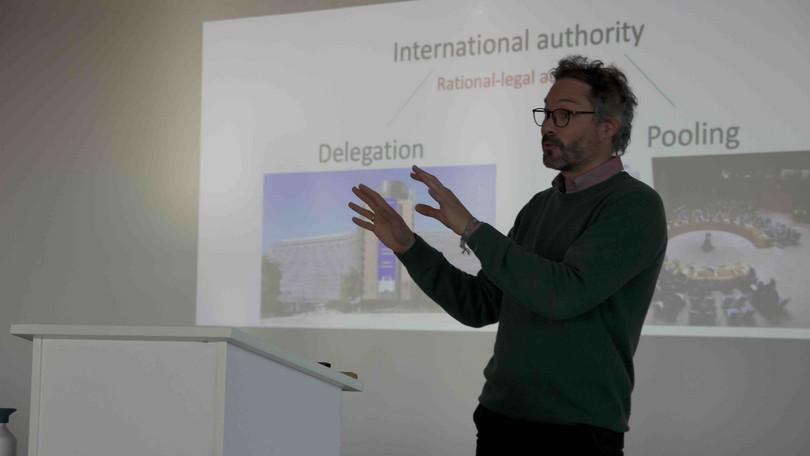 ©Leuphana Universität Lüneburg
©Leuphana Universität Lüneburg
 ©Leuphana Universität Lüneburg
©Leuphana Universität Lüneburg
 ©Leuphana Universität Lüneburg
©Leuphana Universität Lüneburg
25 October 2024
- Panel 1: Environment
- Chad Patrick Osorio (Wageningen University) - Global crime, local consequences: Analyzing the UNTOC’s proposed third additional protocol and unequal access to wildlife resources
- Philipp Rehm (Humboldt University Berlin) - Reconstructing the Relationship between Humans and Non-Humans: the “Common Heritage of Kin-Kind” and its Consequences for the LOCAL
- Panel 2: Digital & Investment
- Claudia Pharaon (Leiden University) - Global Transformations and Reinvention of the International Investment Law System'
- Gülce Kormaz (Leuphana University Lüneburg) - How Can the EU's DMA and DSA contribute to the objectives of the UN's Global Digital Compact?
 ©Leuphana Universität Lüneburg
©Leuphana Universität Lüneburg
 ©Leuphana Universität Lüneburg
©Leuphana Universität Lüneburg
 ©Leuphana Universität Lüneburg
©Leuphana Universität Lüneburg
26 October 2024
- Panel 3: Global Structures I
- Amon Elpídio da Silva, Thiago Ferreira Almeida (beide: Universidade Federal de Minas Gerais) - From Margins to Center: The Global South's Role in Global Climate Transformations
- Daniel R. Quiroga-Villamarin (Geneva Graduate Institute) - Challenging the Global Herrenhaus: The Unending Quest to Democratize International Relations within, and beyond, the United Nations
- Michał Byczyński (University of Lodz) - Navigating a Multilayered World: The Role of WHO’s Human Rights Indicators in Global Health Governance
- Panel 4: Peacekeeping
- Kirsten Hartmann (Bundeskanzler-Helmut-Schmidt-Foundation) - Into the Blue? – The future(s) of UN peace operations in a changing environment
- Panel 6: The International Court of Justice I
- Gaelle Foucault (Université de Montréal) - The Aim of Modernizing the United Nations at the Summit of the Future: The critical absence of the international court of justice in the discussions
- Hendrik Matthis Drößler (Groningen University) - Keeping Score: The ICJ's overlooked Role in post-judgment Compliance
- Panel 7: The International Court of Justice II
- Maren Solmecke, Johannes Ipsen (beide: Leuphana University Lüneburg) - Advisory Opinions in International Law
- Julia Sochacka (University of Warsaw) - Transformation catalyzed by judicial inaction: the immunity of central banks in the ICJ’s Certain Iranian Assets case
- Wrap-Up & Closing Session
Debate on the US Presidential Election
18 November 2024
Participating Fellow: Klara Westerlage
The US presidential election on 6 November 2024 is not only of paramount importance for the national interests of the United States. It will also set the course for the (further) development of the international order, for Europe's role in the world, and for issues as important as multilateralism and global security.
Against this background, we were keen to put the results of this election into perspective with the help of recognised experts in the field. To this end, Ms Kerstin Kohlenberg and Prof. Dr Astrid Séville met on the evening of 18 November for an exciting and highly informative dialogue. Ms Kohlenberg is a journalist for DIE ZEIT, former Washington D.C. correspondent, and author of the 2024 book 'Das amerikanische Versprechen' (link). Prof. Dr. Séville is Professor of Political Science, in particular Political Theory (link) at the Leuphana University Lüneburg.
In their debate, the two panellists focused primarily on the domestic reasons for the outcome of this election, addressing the internal divisions in US society and placing the events in the wider context of recent US history. Ms Kohlenberg's insights from her work as a correspondent and from her book served as a starting point for behind-the-scenes insights, allowing the audience to look deep into the soul of American society, its problems, and the reasons for the sometimes widely divergent world views, values, and political positions of the different social classes within the country.
We would like to thank Ms Kohlenberg and Professor Dr. Séville for their participation in this event and for allowing us to be part of their fascinating exchange of ideas. We would also like to thank Ms Klara Westerlage (link), a doctoral student at the Joachim Herz Doctoral School of Law, for introducing us to this event.
Guest Lecture: Martin Kobler on the Crisis of Multilateralism
06 February 2025
On 6 February 2025, Martin Kobler was a guest at Leuphana University Lüneburg. On this occasion he shared his experiences in international politics with the fellows of the Joachim Herz Doctoral School of Law and other interested parties. He focused in particular on the crisis of multilateralism, wars and conflicts, and current challenges to the international order.
Mr Kobler is a former diplomat and ambassador of the Federal Republic of Germany to Egypt, Iraq, and Pakistan. He has also held a number of senior positions at the United Nations, serving as Special Representative of the UN Secretary-General for the UN Support Mission in Libya, the UN Stabilisation Mission in the Democratic Republic of the Congo, and the UN Support Mission in Iraq. He also served as Deputy Head of the UN Mission in Afghanistan.
These profound insights into the processes of high-level international politics, bilateral and multilateral diplomacy, and crisis and conflict management make his assessments of the current global situation unique and invaluable. Understanding this background is essential for doctoral students in the Joachim Herz Doctoral Programme who are involved in global, international, or interstate transformation processes. Reports from international practice and glimpses behind the scenes therefore enable them to develop a better and more substantiated understanding of how solutions can be achieved in this context - or where they may not be feasible due to political constraints.
Mr Kobler dealt with the above topics with a keen sense of political and legal pitfalls, outstanding expertise, and always in an entertaining and humorous way. In doing so, he enabled his audience to gain a better understanding (of the practical aspects) of the international system. We thank him very much.
Following the success of the first edition, the Climate Justice Lab is entering its second round. In the 2025/26 academic year, the Lab will take place in collaboration with Wageningen University & Research and Tilburg University, focusing on the role of national and international courts in the context of climate justice.
Further information is available here (link).
COP30 Panel Discussion: The Future of Climate Governance
22 October 2025
Participating Fellow: Maren Solmecke
On 22 October 2025, the Joachim Herz Doctoral School hosted a panel discussion on 'The Future of Climate Governance', focusing on the upcoming COP30 conference (from 10 to 21 November 2025 in Belém, Brazil). COP stands for 'Conference of the Parties' to the United Nations Framework Convention on Climate Change. The World Climate Conference, held annually since 1995, serves as a central forum for discussing progress in combating climate change and further developing global efforts to limit temperature rise and reduce greenhouse gas emissions.
This panel discussion featured:
Hamad Mota Kalaf, Second Secretary at the Brazilian Embassy in Germany;
Sarah Zitterbarth, an expert on international climate policy at Greenpeace Germany;
Dr Eduardo Gonçalves Gresse, deputy professor of sociology at the University of Hamburg.
The speakers offered insights from the perspectives of government, civil society, and academia regarding the upcoming negotiations on the future of global climate protection. Brazil, a country that has distinguished itself in recent years as a pioneer of stricter climate protection legislation, is hosting this year's conference. Despite countervailing trends (e.g. the current crisis of multilateralism), there is hope that this year's conference will comprise progressive initiatives and decisions.
Moderated by Maren Solmecke, a doctoral candidate at the Joachim Herz Doctoral School, the event provided a forum to exchange views on expectations for COP30. The speakers discussed (inter alia) the challenging situation at an international (legal) level, the difficulties currently facing global environmental and climate protection, and possible courses of action for the international community. Their informed contributions offered detailed and enlightening insights into the upcoming World Climate Conference.
Climate Justice Lab
Academic Year 2024/25
Participating Fellows: Stephanie de Sousa Vieira, Saumya Raval, Maren Solmecke
The Climate Justice Lab took place during the 2024/25 academic year. As part of the project, 15 young researchers (mostly doctoral students and postdoctoral researchers) gathered at Leuphana University Lüneburg to explore and discuss climate justice in a series of workshops.
The project had two core objectives:
Firstly, it gave participating young scientists the opportunity to openly discuss and test a research idea with colleagues from the same field in a closely supervised project from the outset. As the project culminated in the publication of an edited collection, encompassing a research contribution from each participant, the Climate Justice Lab provided a safe space to develop academic writing skills, while offering the chance to publish the resulting research.
Secondly, the Climate Justice Lab also served as a forum for discussions within the group and with experts. Professor Louis Kotzé (Wageningen University) closely supported the project. Additionally, Professor Radha D’Souza, from the University of Westminster, provided insight into her project on the Court of Intergenerational Climate Crimes (link) during the first workshop, which took place on 29 and 30 October 2024. During the open university screening of the film Water for Life (2023, link), Lab participant Andrea Pietrafesa (ECCHR) reported on her experiences of the legal struggle for access to water, especially among indigenous peoples, in Latin America.
Subsequent digital meetings in December 2024 and March 2025 featured presentations by Professor Oliver Fuo (North-West University) and Dr Thalia Viveros Uehara (Tilburg University). During the final on-site workshop, which took place from 15 to 17 April 2025, Tabea Lissner (Robert Bosch Stiftung), Dr Patrick Toussaint (African Futures Lab), and Silvia Rojas Castro (ECCHR) provided further insights into their work and academic activities related to climate justice.
On 17 April, the Climate Justice Lab came to a close with a public project presentation. This event included a keynote speech by Professor Kotzé, exemplary presentations of two papers produced in this context by Dr Manuela Niehaus (University of Speyer) and Maren Solmecke, and a panel discussion with Professor Dr Jelena Bäumler, spokesperson for the Joachim Herz Doctoral School of Law, among others.
Over the coming months, the edited collection will be prepared for publication to make the results accessible to a wider audience.
We would like to thank everyone involved, especially the participants, for their input and commitment.
- Chad Osorio (Wageningen University)
- Verena Kahl (Universität Hamburg)
- Rebecca Fenn (Tilburg University)
- Saumya Raval (Leuphana Universität Lüneburg) und Saparya Sood (Max Planck Institute for Research on Collective Goods)
- Chancia Ivala (Université Paris 1 - Panthéon Sorbonne)
- Maren Solmecke (Leuphana Universität Lüneburg)
- Dr. Franziska Albrecht (Green Legal Impact)
- Dr. Manuela Niehaus (Universität Speyer)
- Stephanie de Sousa Vieira (Leuphana Universität Lüneburg)
- Andrea Pietrafesa (ECCHR)
- Erriketi Tla Nta Silva (Wageningen University, College of Europe)
- Lea Frerichs (Universität Hamburg)
- Amon Elpídio (Federal University of Minas Gerais)
- Rosanna Anderson (Tilburg University)
Panel Organisation: Public Climate School (University of Hamburg)
20-22 May 2025
Participating Fellows: Stephanie de Sousa Vieira, Saumya Raval
From 20 to 22 May 2025, the Interest Group 'Climate Law in an International Context' (CLIC) at the University of Hamburg's Faculty of Law organised a Public Climate School in Hamburg, with the kind support of the University, the Europakolleg Hamburg, and the Universidad de Chile. The event featured a variety of formats, including workshops, lectures and film screenings, with the aim of raising awareness of climate justice issues and encouraging discourse with a broader audience.
As part of this project, Joachim Herz doctoral programme members Stephanie de Sousa Vieira and Saumya Raval offered a workshop entitled 'Justice Divided? States, Corporations and Climate Justice Between the Global North and South', addressing questions of climate justice and responsibility for climate change.
They focused on the unequal relationship between the Global North and South with regard to climate issues. This is evident in the fact that countries in the Global South are disproportionately affected by the consequences of climate change despite having contributed relatively little to it. In contrast, the Global North, which has been the main source of greenhouse gases for the past 200 years, and its companies have experienced comparatively few negative consequences from the climate change they have caused. The workshop focused on this unequal distribution of the burden and how this and the associated responsibility can be legally addressed.
Participation in the K3 Climate Communication Congress
25 - 26 September 2024 in Graz/Austria
Participating Fellows: Maren Solmecke, Bengt Johannsen
This year's K3 Congress on Climate Communication (link) took place at the University of Graz on 25 and 26 September 2024. More than 370 scientists, journalists, and activists came together to discuss the current challenges of communicating the climate crisis in science and society.
The two fellows of the Joachim Herz Doctoral School of Law, Bengt Johannsen and Maren Solmecke, took this opportunity to hold a workshop entitled ‘Talking climate law - communication about law in social transformation’, in which 25 participants took part. The workshop began with a 30-minute keynote speech by the two fellows on the legal framework of the climate crisis and the legal levers for climate protection.
This was followed by a lively discussion with the participants on the opportunities and limits of the law in social transformation, especially in the case of the climate crisis. It was emphasised that the difficult enforcement, e.g. in the case of judgements against states/governments, and the time factor limit the efficiency of the law with regard to climate protection. On the other hand, it was positively noted that the law and courts enjoy a high level of social authority and can thus contribute significantly to the legitimisation of climate protection. At the same time, it was questioned whether it is known to what extent successful climate lawsuits have actually led to concrete reductions in greenhouse gas emissions, or whether climate lawsuits have a primarily symbolic function.
Afterwards, the participants analysed an excerpt from the ECHR decision, Verein KlimaSeniorinnen Schweiz and Others v. Switzerland [GC] - 53600/20 Judgment 9.4.2024, and presented the main statements in the form of an ‘elevator pitch’ (of 30 seconds).
Participation in the LCOY 2024
25 - 27 October 2024 in Berlin
Participating Fellows: Maren Solmecke, Bengt Johannsen
The LCOY, the Local Conference of the Youth (link), took place in Berlin on the last weekend of October. It is the largest German climate conference for young people, bringing together 1,100 participants (aged between 14 and 30) from all over Germany and 350 international speakers to learn, share, and discuss current issues around the climate crisis.
The Joachim Herz Doctoral School of Law was represented with two workshops in the thematically wide-ranging programme, which covered topics from the circular economy to socially responsible climate policy.
Maren Solmecke spoke about the climate crisis as a flight risk in international law. Read her feedback on the event:
The conference is a great opportunity to get in touch with many young people who care about the climate. Many important issues are identified and discussed in the joint work. I am delighted to be able to share my research here and get a lot of new input for my work.
Together with Bengt Johannsen, Maren also offered another workshop on the legal framework of the climate crisis and climate litigation. Bengt's conclusion was:
I find the positive atmosphere and the willingness to take action incredibly motivating. The various workshops and panels contributed to very interesting discussions and approaches for effective climate protection. Maren's and my workshop 'Talking Climate Law' led to a lively exchange and above all to the realisation that law can and should contribute to overcoming the climate crisis.
The second workshop in particular was mainly attended by law students. Maren and Bengt hope that they have been able to share and convey their enthusiasm for their discipline and for topics outside the curriculum of regular legal studies.
Participation in COP29
11 - 22 November 2024 in Baku, Azerbaijan
Participating Fellows: Stephanie de Sousa Vieira
This year, Joachim Herz Fellow Stephanie Vieira attended COP29, the largest global conference on climate change under the United Nations Framework Convention on Climate Change (UNFCCC).
At the conference, Stephanie participated as a member of the YouthCOP organising committee and as a Party Overflow delegate for Brazil. The Youth COP is a unique initiative that brings together young students from around the world to simulate COP negotiations. Organised by Université Paris Cité (France), Universidade Federal do Ceará (Brazil), and Sorbonne University Abu Dhabi (UAE), in partnership with YOUNGO/UNFCCC, the Youth COP promotes critical thinking, teamwork, and negotiation skills while tackling the challenges of climate change.
On 11 November, to kick off activities at the Ocean Pavilion, Stephanie co-moderated the panel "Youth Voices Tackling Ocean, Biodiversity and Energy Challenges for a Sustainable Future". This session presented the results of the Youth COP mock negotiations, highlighting the important role of young leaders in shaping actionable solutions for a sustainable future.
This experience was not only an opportunity for Stephanie to contribute to global climate discussions, but also an invaluable addition to her academic journey and research. Engaging with diverse perspectives and participating in high-level dialogue at COP29 reinforces her commitment to exploring the global impact of sustainability-driven regulation and its influence on business practices and environmental agendas, key themes of her doctoral research at the Joachim Herz Doctoral School of Law.

